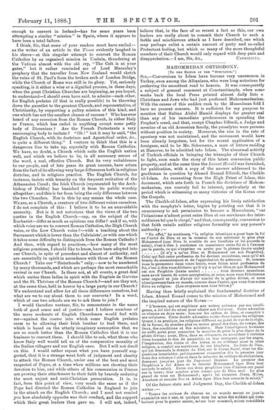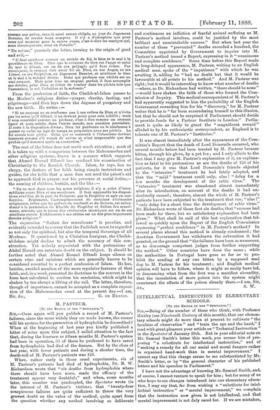IfAHOMMEDAN ORTHODOXY.
[To THE EDITOR OF THE " $PECTATOR...3 SIR,—Conversions to Islam have become very uncommon in Turkey, even among the Albanians, who were long notorious for
preferring the smoothest road to heaven. It was consequently a subject of general comment at Constantinople, when some weeks back the local Press printed almost daily lists o Christians and Jews who had just professed Mahommedanism.
With the causes of this sudden rash to the Mnssulman fold I have no present concern. It is sufficient for my purpose to mention that Sultan Abdul Hamid displays far greater zeal than any of his immediate predecessors in spreading the Prophet's creed, and that, except Chaphaz Effendi, a Judge and
member of an old Armenian family, the proselytes were persons without position in society. Moreover, the rise in the rate of apostasy was not maintained, and the movement would have been already forgotten, but for the recent application of a foreigner, said to be Mr. Schumann, a man of letters residing at Hanover, to be admitted into Islam. The abnormal activity of Turkish officials in bringing the triumphs of their Church
to light, soon made the story of this latest conversion public property, and at the same time the Levant Herald was furnished, for publication, with a copy of the answer addressed to the gentleman in question by Ahmed Essaad Effendi, the Cheiklr- nl-Islam. As emanating from the High Priest of Islam, this document, which sets forth in French the doctrines of Mahom- medanism, can scarcely fail to interest, particularly at the period which is witnessing so many victories of the Koran over the Gospels.
The Cheikh-ul-Islam, after expressing his lively satisfaction with the neophyte's letter, begins by pointing out that it is unnecessary to ask permission to become a Afussulman, "car l'islamisme n'admet point entre Dieu et sea serviteurs des inter- mediaires tel que le clerge," and that, consequently, conversion to that faith entails neither religious formality nor any person's authority :—
"En effet," he continues, "la religion islamique a pour base la foi en l'unite de Dieu at ea is mission de son serviteur le plus char Mohammed (que Dieu le comble de sea bienfaits et lui accorde le
saint), c'est-a-dire confirmer en conscience cotta foi at b l'avouer par la parole, ce qui s'exprime en arabe par la phrase (texts arabe) (ii n'y a qu'un Dieu et Mohammed eat son Propbete). Celui qui fait cette profession de foi devient musnlman, sans qu'il ait besoin du consentement at de l'approbation de personae. Si, comma vous le promettez dans votre lettre, vous faitea ainsi profession de fel, c'est-a-dire yeas declarez qu'il n'y a qu'un Dieu at que Mohammed eat son Prophet° (texts arabe) vous devenez musulman sans avoir besoin de notre acceptation, et nous, nous vous feliciterons avec orgueil at joie d'avoir ete touché de la grace divine, at nous temoignerons dans ce monde, oomme dans l'autre, qua von° etas notre fare en religion. (Les croyants sont tons freres.)'
Having thus briefly explained the fundamental doctrine of Islam, Ahmed Essaad comes to the mission of Mahomined and the inspired nature of the Koran :—
" L'homme, qui eat superieur aux autres animaux par eon intelli- gence, a ete tire du neant pour adorer son Createur. Cotta adoration se resnme en deux mots: honorer lee ordres de Dieu, et compatir see creatures. Cette double adoration exists dans toutes lea religions. Qaant I sa pratique, lee religions different an point de rue de la regle, de la forme, du nombre plus ou moms grand des rites, du temps, des lieux, des conditions et des mini:Ares. Maio Pintelligence humaine ne suffit point pour connaltre In maniere de prier la plus digne do la gloire divine; aussi, Dieu, dans ea °lenience, en accordant I certains etres humains le don de prophetie, en leur envoyaut, par lee anges, l'inapiration, des emits et des Evros, et en revelant ainsi is vraie religion, a comble see serviteurs de sea bienfaits. Le livre de Dieu, qui eat descendu le denier du Ciel, eat le Coran Seer& dont lee dis- positions invariableP, precieusement conservecs des le premier jour dans des volumes &nits at dans la me:noire de milliers de recitateurs, dareront jusqu'au jou'. dii Jagement Dernier. Le premier des Propbetes a etc; Adam at le denier Mohammed (que Dien leer accorde le salut). Entre ces deux propbetes bien d'autres ont passé sir In terra; leur nombre n'est connu qua de Dieu seal. Le plus grand de tons eat Mohammed ; aprea Jai viennent Jesus, Maw, Abraham et ensuite Noe at Adam (qua Dien leur accorde le salut)."
Of the future state and Judgment Day, the Cheikh-nl-Islam writes :—
" Mutes lee actions de chscan en ce monde seront oe jonr-16, examines um a, nue, et quoique tens lee actes doe &Oats qai corn- battent pour la guerre saute, meme lenr sommeil, soient consideres comme one priere, aussi seront obliges, an jour du Jugement
Dernier, de rendre leurs comptes. El n'y a d'exception quo pour cella qui menrent pour la salute cause, c'est-h-dire lea martyrs qui, sans interrogatoire, front en Pamdis."
"De meme," proceeds the letter, turning to the origin of good
and evil,— "II faut attribuer comma no article de foi, Is Wen et le mal it la providence de Dien. Dire quo le createur du bien est range et celui du mal le demon, eat on de ces prejuges qu'il hint eviter. Par consequent, le croyant doit avoir foi en Dien, en sea Anges, en see Livres, en see Prophates, an Jugement Dernier, et attribuer le bien et le mal A la volonte divine. Celui qui professe cos verites eat tin vrai croyant. Mais pour etre un croyant parfait il faut accomplir sea devoirs, prier Dieu et eviter de tomber dans lea peches tele quo rassassinat, le vol, l'adultere et la sodomie."
From the profession of faith, the Cheikh-ul-Islam passes to the Moslem's religious duties—prayer, charity, fasting, and
pilgrimage—and then lays down the dogmas of purgatory and the new birth. He writes :—
" Si on croyant ne se conforme pas it ces ordres de Dien et n'evite pas lee actes gull defend, il ne devient point pour cela infidele; mais il sera considere comme on pechenr, c'est-a-dire comme un croyant egare et aura merite, dans l'antre monde, une ponition provisoire. Ii reste it la disposition divine; Dien lui pardonne ou 10 condamne it passer en enfer no laps de temps en proportion avec sea peches. La foi annule tout peche. Celui qui se convertit it l'islamisme devient innocent comme s'il venait de mitre et &est responsable qua des pooh& commet apres ea conversion."
The rest of the letter does not merit much attention ; most of
it is taken up with a comparison between the Mahommedan and other religious systems, drawn in a manner which suggests that Ahmed Essaad Effendi has confined his examination of
Christianity to the Romish Church. Islam, he says, has no clergy, the doctors of her faith being simple instructors and guides, for she holds that a man does not need the priest's aid to approach God in prayer, nor his presence at social duties,— the naming of children, burials, and the like :—
"En no mot dans tons lea actes religienx, il n'y a point d'inter- mediaire entre Dieu et ses serviteurs. 11 faut apprendre lea disposi- tions revelees, do la part do Createnr, par le Prophete et agir en con- formite. Senlement, l'accomplissement de certaines ceremonies religiensee, telles quo lea prieres du vendredi et du Bairam, eat subor- donne it la permission du Khalife du Prophete et Sultan des musul- mans, attendn quo la tenne des ceremonies islamiques eat nn de sea attributs sacres. L'obeissance it see ordres eat on des plus importants devoirs religieux."
The expression "Sultan des musulmano " is peculiar, and evidently intended to convey that the Padishah must be regarded as not only the spiritual, but also the temporal Sovereign of all
Moslems. If questioned by a Christian foreigner, the Cheikh- nl-Islam might decline to admit the accuracy of this con- struction. Yet nobody acquainted with the pretensions of Abdul Hamid can entertain doubt on the subject. It should be further noted that Ahmed Eosaad Effendi keeps silence on certain rites and opinions which are generally known to be considered essential to a perfect confession of Islam. He has, besides, avoided mention of the more repulsive features of that faith, and, in a word, presented its doctrines to the convert in the form best calculated to confirm his resolution, which might be shaken by too abrupt a lifting of the veil. The letter, therefore, though of importance, cannot be accepted as a complete exposi- tion of the Mahommedan creed at the present day.—I am,



































 Previous page
Previous page